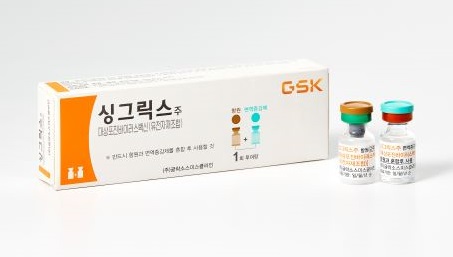GSK's shingles vaccine Shingrix is associated with an increased risk of herpes zoster ophthalmicus (HZO) recurrence, suggesting that patients with a history of the disease should be monitored closely after vaccination, a new study said.

Last Thursday, local time, researchers from the University of California, Los Angeles, published the results of a retrospective cohort study examining the risk of HZO recurrence after vaccination with the recombinant zoster vaccine (RZV) Shingrix in the JAMA (Journal of American Medical Association) Ophthalmol.
"RZV is currently recommended for immunocompetent adults aged 50 years and older or immunocompromised adults aged 19 years and older and is effective in preventing ocular herpes zoster," the researchers noted. "Still, questions remain about whether RZV is safe in patients with a history of HZO."
In response, the researchers conducted a retrospective cohort analysis using pharmacy claims data from commercial and Medicare Advantage members in the OptumLabs Data Warehouse (OLDW) to assess whether there is an increased risk of HZO recurrence after RZV vaccination in patients with a history of HZO.
Patients with HZO occurring between Jan. 1, 2010, and Dec. 31, 2021, were included, and the study ended on March 31, 2022.
The vaccinated group consisted of patients who received at least one dose of RZV within 90 days of their initial HZO diagnosis, and the unvaccinated group consisted of patients with no record of RZV during the study period. Vaccinated and unvaccinated patients were matched exactly 1:1 with no substitution.
Data from 16,408 patients were included in the analysis -- 3,646 patients in the RZV vaccinated group and 12,762 patients in the unvaccinated group.
As a result, within 56 days of the start of follow-up, the relapse rate in the RZV vaccinated group was 37.7 per 1,000 person-years compared to 26.2 in the unvaccinated group.
Even after adjusting for race and ethnicity, length of hospitalization, emergency department visits, concomitant vaccines, and eye care visits, RZV vaccination was associated with a 64 percent increased risk of HZO recurrence.
"These results support the notion that patients with a history of HZO should consider being monitored by an ophthalmologist after RZV vaccination for recurrence," the researchers suggested.
Although several cases of HZO reactivation after exposure to both recombinant and live vaccines have been reported in the literature, to our knowledge, there are no published data on the safety and effectiveness of RZV in patients with a history of HZO, the researchers said. Keratitis was the most common manifestation of HZO reactivation, beginning one to three weeks after RZV vaccination, they added.
"Despite these findings, RZV remains effective in preventing herpes zoster, including HZO," the researchers concluded. “It is important to encourage vaccination, especially given the increasing incidence of herpes zoster in the United States and its potential complications."
Related articles
- Vaccine manufacturers affected by the endemic struggle to boost declining sales
- Will GC Biopharma release rival shingles vaccine against GSK's Shingrix?
- KDCA mulls national immunization program expansion for shingles
- ‘State support needed for shingles vaccination among aged, poor people’
- GSK’s Shingrix tops singles vaccine sales in Korea in 2023: IQVIA data
- Why is Shingrix, the only shingles vaccine available for cancer patients, so painful?

